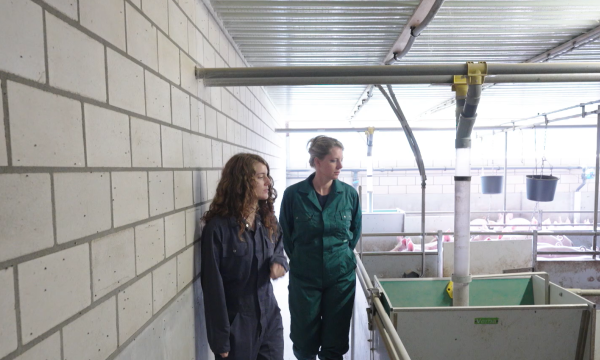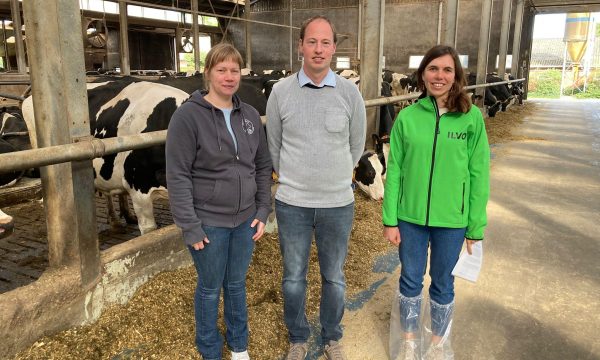Theme Role of animal production in society
We are committed to using our research to promote a livestock industry that both farmersand citizens can feel good about. We aim for an animal-friendly production that combines a lowenvironmental impact with a fair return and a healthy product with a delicious taste. In thisway, we help to maintain international and local competitiveness.
Quick links
Our scientific research also provides opportunities to fit local livestock farming into a circular food production system in a sustainable way. As societal concerns about (large-scale) livestock production increase, the resilience and resilience of the sector become critical for the future.
Broad fundamental knowledge needed
Livestock production produces many valuable end products, such as dairy, meat and eggs. Nevertheless, its impact on the environment cannot be denied. At the local level, this is mainly related to excessive nitrogen and the eutrophication and acidification of the soil and groundwater. Globally, livestock farming has negative consequences for the climate and biodiversity. The intensive use of antibiotics can also lead to problems.
ILVO approaches all of these aspects from an overarching system approach. We rely on a thorough
knowledge of all sub-aspects, such as physiological and production processes, housing systems and
technological expertise. We strive to understand the fundamental links between feed and management as well as animal health, animal performance, product qualities and environmental effects. We invest in intelligent data use, sensors and microbiome and metagenomics research, among others. Our living labs guarantee that our knowledge is built up in collaboration with various stakeholders, and that innovations and improved management are quickly rolled out in the sector.
Tailor-made livestock farming
End users and food processing companies have very different expectations of livestock farming. Some attach more importance to animal welfare or a low ecological impact, others to correct prices, an authentic product or a higher quality of life for the farmers. ILVO translates these priorities into the knowledge and communication that livestock farmers need to pursue a particular goal or profile. By adjusting management in different areas - such as feeding, housing or genetics - we optimize animal welfare, taste, nutritional value, the feed/food ratio, water consumption and various emissions.
Space for livestock
The livestock industry is increasingly encountering space-related barriers, such as limited access to land, neighborhood protests, environmental permits and current regulations. The strong fragmentation of the landscape and of farms leads to discussions. In addition, livestock farming is a much-discussed topic that generates a range of opinions.
ILVO supports farmers, policy makers and social actors by mapping out all kinds of space-related aspects. For example, we synthesize the space actually available for various types of livestock housing and designs. We also conduct research into modular construction techniques and the integration of animal housing into the landscape. Farm-specific permit parameters around odor and environmental impact are assessed for their scientific weight and (un)certainty. When based on correct data, simulations and dialogues go more smoothly.
Residual flows and loops
In the context of circular agriculture, ILVO is investigating whether biomass and residual flows can be used more efficiently as animal feed. That should result in less protein being imported from overseas. We can close these loops by making maximum use of roughage from permanent pastures. Our expertise in the field of feed evaluation and animal performance contributes to the societal choices we make about biomass, residual streams and by-products, and of additives in animal feed. Our objective knowledge allows us to rationalize choices and reduce competition between food, feed, fuel and fiber.
Attention to animal welfare
Society is becoming more sensitive to the welfare of animals in production systems. ILVO’s expertise helps the agricultural sector to deal with this. Among other things, we optimize the scientific basis of the concept of ‘animal welfare’ and develop new welfare indicators. We also perfect protocols to determine animal welfare on a farm and throughout the food chain. Thus we support the use of specifications, labels and quality marks.
ILVO proactively looks for points of improvement with regard to animal welfare and for feasible solutions to welfare problems. We always start from a system approach, so that we can identify the underlying causes of certain problems.
Objective information and social dialogue
ILVO stimulates the dialogue within agriculture and the agri-food sector. At each link in the chain it is important to understand how environmental impact, animal welfare and profitable production are measured and what efforts this requires. We underpin the social and political debate with scientific insights. In dialogue with the sector we work proactively on livestock farming systems that take public opinion and future legislation into account.
Contact an expert







